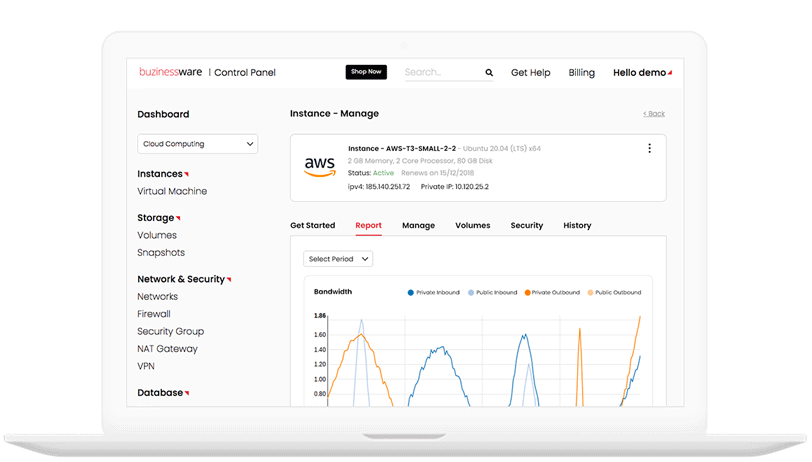Exploring the Advantages of Cloud Server Hosting in Dubai, UAE & Saudi Arabia Data Center: Your Ultimate Guide
Cloud server hosting offers numerous advantages for businesses operating in Dubai, UAE, and Saudi Arabia, particularly when hosted in data centers located within these regions. Here's a comprehensive guide outlining the benefits:
- Scalability: Cloud server hosting allows businesses to scale their resources up or down based on demand. This is crucial for companies in Dubai, UAE, and Saudi Arabia, where market dynamics can fluctuate rapidly. Whether it's handling increased traffic during peak seasons or scaling down during slower periods, cloud servers offer the flexibility needed to optimize resource utilization and maintain performance.
- Cost Efficiency: Traditional server hosting often requires significant upfront investment in hardware and infrastructure. Cloud server hosting, on the other hand, operates on a pay-as-you-go model, allowing businesses to avoid large capital expenditures. In addition, cloud hosting providers typically offer competitive pricing and various pricing plans, enabling businesses to choose the most cost-effective option for their needs.
- Reliability and Redundancy: Data centers in Dubai, UAE, and Saudi Arabia adhere to strict standards for reliability and redundancy to ensure continuous operation. Cloud hosting providers often deploy redundant hardware, power sources, and network connections to minimize the risk of downtime. This level of reliability is essential for businesses operating in these regions where downtime can result in significant financial losses and damage to reputation.
- High Performance: Cloud servers hosted in data centers within Dubai, UAE, and Saudi Arabia leverage state-of-the-art infrastructure to deliver high performance and low latency. This is especially important for businesses that rely on real-time data processing, such as e-commerce platforms or financial institutions. By hosting servers closer to their target audience, businesses can reduce latency and improve user experience.
- Security and Compliance: Data security and regulatory compliance are top priorities for businesses operating in Dubai, UAE, and Saudi Arabia. Cloud hosting providers invest heavily in security measures, including encryption, firewalls, and intrusion detection systems, to protect data against unauthorized access and cyber threats. Moreover, hosting data within local data centers helps businesses comply with regional data sovereignty regulations.
- Ease of Management: Cloud server hosting simplifies server management tasks by offloading hardware maintenance, software updates, and security patches to the hosting provider. This allows businesses to focus on their core activities without having to worry about managing complex IT infrastructure. Furthermore, cloud hosting platforms often provide intuitive management interfaces and automation tools to streamline administrative tasks.
- Disaster Recovery and Business Continuity: Cloud hosting providers offer robust disaster recovery solutions, including data replication, backup, and failover capabilities. In the event of a hardware failure or natural disaster, businesses can quickly restore operations and minimize downtime by leveraging cloud-based backup and recovery options. This level of resilience is crucial for businesses in Dubai, UAE, and Saudi Arabia, where disruptions can have severe consequences.
- Global Reach: Cloud server hosting enables businesses to reach a global audience by leveraging the provider's network of data centers worldwide. This is particularly advantageous for businesses in Dubai, UAE, and Saudi Arabia that operate internationally or serve customers in different geographic regions. By deploying servers in strategic locations, businesses can ensure optimal performance and availability for their global user base.
In summary, cloud server hosting offers a myriad of advantages for businesses in Dubai, UAE, and Saudi Arabia, particularly when hosted in local data centers. From scalability and cost efficiency to reliability and security, cloud hosting empowers businesses to leveragecutting-edge technology and focus on driving growth and innovation in a dynamic and competitive market landscape.
Maximize Your Business Potential with Cloud Server Hosting
Cloud server hosting offers numerous benefits for businesses looking to maximize their potential. Here are several ways cloud server hosting can help businesses thrive:
- Scalability: Cloud hosting allows businesses to easily scale their resources up or down according to their needs. Whether you're experiencing rapid growth or seasonal fluctuations in demand, cloud hosting ensures you have the necessary computing power without overpaying for unused resources.
- Cost Efficiency: Traditional server hosting requires significant upfront investment in hardware, maintenance, and IT infrastructure. With cloud hosting, businesses can avoid these capital expenses and instead pay for what they use on a subscription basis. This pay-as-you-go model can lead to significant cost savings over time.
- Reliability and Uptime: Cloud hosting providers typically offer robust infrastructure with redundant systems and data backups, minimizing the risk of downtime. This ensures that your business applications and services remain accessible to customers, enhancing reliability and customer satisfaction.
- Global Reach: Cloud hosting providers have data centers located across the globe, allowing businesses to easily reach customers in different geographic regions. This global presence improves latency and load times for users, resulting in a better overall experience.
- Flexibility and Accessibility: Cloud hosting enables employees to access business applications and data from anywhere with an internet connection. This flexibility promotes collaboration and remote work, which is especially valuable in today's distributed workforce.
- Security: Cloud hosting providers invest heavily in security measures to protect against data breaches and cyber threats. They employ advanced encryption, firewalls, and monitoring tools to safeguard sensitive information, offering businesses peace of mind knowing their data is secure.
- Disaster Recovery: Cloud hosting providers offer built-in disaster recovery solutions, ensuring business continuity in the event of unforeseen incidents such as hardware failures, natural disasters, or cyber-attacks. Data backups and failover mechanisms help minimize downtime and data loss, enabling quick recovery.
- Resource Optimization: Cloud hosting allows businesses to optimize their IT resources by leveraging features such as auto-scaling, load balancing, and resource allocation. This ensures efficient use of computing resources, maximizing performance and cost-effectiveness.
- Support and Maintenance: Cloud hosting providers offer round-the-clock technical support and maintenance services, relieving businesses of the burden of managing their own infrastructure. This allows internal IT teams to focus on strategic initiatives rather than routine maintenance tasks.
- Innovation and Agility: Cloud hosting empowers businesses to innovate and experiment with new technologies more easily. With access to a wide range of cloud services such as AI, machine learning, and IoT, businesses can quickly develop and deploy innovative solutions to stay ahead of the competition.
By leveraging the power of cloud server hosting, businesses can unlock new opportunities for growth, efficiency, and innovation while minimizing costs and mitigating risks.
FAQ -
Does Cloud Website Hosting Come with a Control Panel?
Cloud website hosting services often come with a control panel, but it depends on the specific hosting provider and the type of plan you choose. Here are some common scenarios:
- Managed Hosting: Many cloud hosting providers offer managed hosting plans where they take care of server management, security, updates, and more. In such cases, they typically provide a control panel or dashboard where you can manage various aspects of your website, such as domain management, file management, email accounts, database management, and more. Examples of control panels include cPanel, Plesk, and custom-built dashboards.
- Self-Managed Hosting: Some cloud hosting providers offer self-managed plans where you have more control over the server configuration and management. In such cases, you might need to set up and configure the server manually through a command-line interface or a web-based control panel provided by the hosting provider.
- No Control Panel: In rare cases, especially with more specialized or bare-bones cloud hosting solutions, you might not get a traditional control panel. Instead, you might have access to a limited set of management tools or APIs to manage your hosting environment.
What Is the Difference Between VPS and Cloud Server Hosting?
Virtual Private Server (VPS) hosting and Cloud Server hosting are both popular options for hosting websites and applications, but they have some key differences:
Infrastructure:
VPS Hosting: In VPS hosting, a physical server is divided into multiple virtual servers, each running its own operating system (OS) instance. These virtual servers share the resources of the physical server, such as CPU, RAM, and storage.
Cloud Server Hosting: Cloud hosting operates on a network of virtual servers that pull their computing resources from extensive underlying networks of physical servers. Cloud hosting offers scalability, as resources can be added or removed dynamically based on demand.
Scalability:
VPS Hosting: Scalability in VPS hosting is limited to the resources allocated to your virtual server. If you need more resources, such as additional RAM or CPU, you may need to upgrade your VPS plan, which may involve downtime.
Cloud Server Hosting: Cloud hosting offers greater scalability. Resources can be scaled up or down on-demand, allowing you to handle fluctuations in traffic without downtime. You can increase or decrease resources like CPU, RAM, and storage as needed, usually through a web interface or API.
Redundancy and Reliability:
VPS Hosting: VPS hosting typically relies on the physical server's hardware. If the hardware fails, it can lead to downtime for your virtual server.
Cloud Server Hosting: Cloud hosting is designed for high availability and redundancy. Resources are distributed across multiple servers and data centers, reducing the risk of downtime due to hardware failures. If one server fails, your application or website can automatically failover to another server.
Billing Model:
VPS Hosting: VPS hosting plans are usually offered on a fixed monthly or yearly basis, where you pay for a predetermined amount of resources regardless of whether you use them fully.
Cloud Server Hosting: Cloud hosting typically operates on a pay-as-you-go or pay-per-use model. You are billed based on the resources you consume, allowing for cost savings when demand is low and scalability when demand is high.
Control and Customization:
VPS Hosting: VPS hosting offers more control and customization compared to shared hosting but may have limitations compared to cloud hosting. You have root access to your virtual server, allowing you to install and configure software as needed.
Cloud Server Hosting: Cloud hosting often provides more flexibility and control. You can customize the infrastructure according to your specific requirements and have access to a wide range of cloud services and management tools.
In summary, VPS hosting is a more traditional and predictable option with fixed resources and less scalability, while cloud hosting offers greater scalability, reliability, and flexibility, making it suitable for businesses with varying resource demands and a need for high availability.








